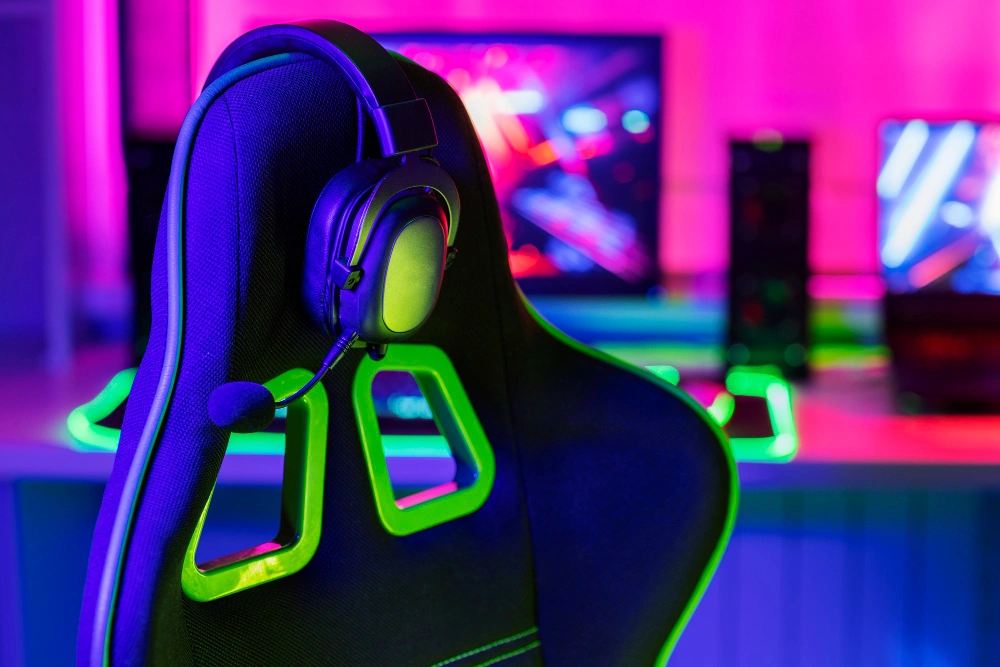Gaming isn’t just for the young—or the ultra-skilled—anymore. Thanks to advancements in AI gaming accessibility, players of all ages and skill levels can now enjoy games that are smarter, safer, and more inclusive than ever.
From 12-year-old beginners learning strategy to 72-year-old retirees rediscovering the joy of play, AI gaming accessibility is changing how we interact with games. It’s not just about making gameplay easier—it’s about making it personalized, supportive, and welcoming for everyone.
Let’s explore how AI is transforming gaming into a more inclusive experience—regardless of age, background, or ability.

1. Adaptive Game Difficulty That Matches Your Skill Level
Gone are the days of getting stuck on impossible bosses or breezing through boring levels. Modern games use adaptive game difficulty, an AI-powered feature that adjusts challenge levels based on your performance.
Smart Examples:
- Resident Evil 4 dynamically tunes enemy aggression
- Celeste offers Assist Mode with customizable difficulty
- Forza Motorsport adjusts racing difficulty in real time
Game On Insight: AI gaming accessibility helps avoid frustration or boredom—keeping players engaged at just the right challenge level.
2. AI Game Coaching That Helps You Improve
Imagine a personal trainer, but for your game skills. AI game coaches analyze your gameplay, identify weaknesses, and provide feedback.
Coaching Platforms:
- Valorant and League of Legends use AI for real-time tips
- Hado AI Coach tracks strategy in eSports training
- EA Sports FC 24 offers AI-driven training drills
Learning Boost: This is perfect for kids learning strategy or adults trying to compete at higher levels.
3. Games Designed with Seniors in Mind
AI gaming accessibility now includes features designed for older adults, from visual aids to simplified controls and cognitive-friendly gameplay.
Top Picks for Seniors:
- Lumosity and Peak (AI brain-training games)
- Wii Sports and Ring Fit Adventure (motion-based games with adaptable AI)
- AARP’s Staying Sharp program (with gamified memory tools)
Bonus: Many titles now include AI gaming accessibility, voice navigation, font scaling, and reduced reflex requirements for a better experience.
4. AI That Creates Personalized Gaming Experiences
Games like Minecraft, No Man’s Sky, and The Sims use procedural generation and AI gaming accessibility to build worlds based on player behavior, preferences, or history.
Why It Matters:
- Replayability is virtually endless
- Each player experiences something unique
- World-building feels more immersive and reactive
Inclusive Bonus: AI ensures that even casual players can feel immersed without needing high-level skills.
5. AI gaming accessibility for Players with Disabilities
From voice commands to eye tracking, AI gaming accessibility empowers gamers with physical or cognitive challenges.
Innovations Include:
- Xbox Adaptive Controller with AI button mapping
- Tobii Eye Tracker for controlling games with eye movement
- Google’s Project Gameface (face-tracking control system)
Inclusive Design: AI ensures that everyone, regardless of ability, can enjoy the thrill of play.
6. Kid-Friendly Games with Built-in AI Safeguards
Worried about your child’s screen time or online interactions? Many AI-powered games now include built-in safeguards and smart parental controls.
Safe Gaming Features:
- Screen time limits using AI behavior tracking
- Real-time chat moderation
- Personalized learning games that adapt to your child’s level
Great Titles:
- Khan Academy Kids, Toca Life World, LEGO Builder’s Journey
Parent Perk: AI also tracks learning milestones while keeping things fun.
7. AI Teammates That Actually Help
Tired of useless NPCs? Modern games feature AI teammates that learn from you, adapt strategies, and fill gaps in multiplayer sessions.
Examples:
- Left 4 Dead and Back 4 Blood use AI teammates with situational awareness
- Battlefield 2042 uses bots with skill-based reactions
- Star Wars Jedi: Survivor includes AI companions that interact contextually
All-Ages Fun: Whether you’re a solo player or can’t coordinate with friends, AI companions keep the game moving.
8. AI gaming accessibility in Board Games & Tabletop Gaming
AI isn’t limited to digital spaces. Tools like AI dungeon masters and smart sensors bring traditional board games to life.
Cool Uses:
- AI narrators in Dungeons & Dragons
- App-enhanced board games like Mansions of Madness
- AI randomizers that adapt storylines mid-game
Family Game Night Upgrade: Makes complex games easier and more dynamic for all generations.
9. Smarter Consoles with Built-in AI Features
Today’s gaming consoles are smarter than ever. Whether it’s optimizing settings or tracking performance, AI works behind the scenes to enhance gameplay.
Built-in AI Features:
- Xbox Series X and PS5 optimize resolution and framerate via AI
- Nintendo Switch uses AI motion detection in fitness and dance games
- AI recommendation engines suggest games based on preferences
Efficiency Bonus: No need to fiddle with menus—AI fine-tunes the fun for you.
10. AI-Generated Game Worlds That Evolve With You
AI gaming accessibility is powering next-gen games where entire universes evolve based on your choices. It’s not just branching storylines—it’s truly dynamic gameplay.
Innovative Examples:
- AI Dungeon creates story-driven RPGs in real time
- Ubisoft Scalar (in development) will use AI to simulate living, breathing game worlds
- Minecraft Mods use AI to teach coding, logic, and game mechanics
Replay Value: Every playthrough is different—and designed to match your pace and personality.
Smarter Gaming for Everyone Starts with AI
AI isn’t just a behind-the-scenes helper—it’s an accessibility revolution. With AI gaming accessibility, games are becoming more intelligent, more inclusive, and more engaging for players of every age.
From coaching beginners to helping seniors stay sharp, the future of gaming is about fun that adapts to you—not the other way around.
Want more on AI gaming accessibility? Check out our Game On category for tech-driven tips, tools, and trends in smart entertainment.
FAQs
1. What is AI-assisted gaming?
AI-assisted gaming uses artificial intelligence to personalize difficulty, suggest moves, or even control in-game elements to improve your experience.
2. Can AI adjust difficulty for beginners?
Yes. Many modern games use adaptive AI to adjust difficulty in real-time based on your skill level and progress.
3. Are there games made for seniors?
Absolutely. Brain games, fitness-based games, and strategy titles now include AI features for ease of use and cognitive engagement.
4. How does AI coaching work in games?
AI tracks your gameplay, identifies strengths and weaknesses, and provides real-time tips or post-game analysis to help you improve.
5. Can AI games teach you to play better?
Yes. AI coaching tools and adaptive tutorials help you build skills and confidence over time.
6. What are safe AI games for kids?
Games with adaptive learning, AI moderation, and parental controls—like Khan Academy Kids or LEGO Builder’s Journey—are ideal.
7. Is AI used in board games too?
Yes. AI narrators and app integration are bringing dynamic storytelling and adaptive mechanics to tabletop games.
8. Are there games where AI becomes a teammate?
Yes! Many co-op games now include AI-controlled teammates that adapt to your playstyle and support you during missions.
9. Can I limit screen time using AI?
AI tools on modern consoles and smart apps allow parents to monitor and limit screen time based on behavior and schedule.
10. Do smart consoles have built-in AI?
Yes. Consoles like Xbox Series X, PS5, and Nintendo Switch include AI-powered features that enhance gameplay, optimize settings, and track user behavior for smarter recommendations.







